- Home
- Maren Smith
Stolen Moments: A Victorian Time Travel Romance
Stolen Moments: A Victorian Time Travel Romance Read online
Stolen Moments
By
MAREN SMITH
Copyright © 2020 by Red Hot Romance Inc.
All rights reserved. No part of this book may be reproduced or transmitted in any form or by any means, electronic or mechanical, including, but not limited to, photocopying or by any information storage and retrieval system, without permission in writing from the author.
This book is a work of fiction. Names, places, locales, and events are either a product of the author’s imagination or are used fictitiously. Any resemblance to actual persons, places, and events are purely coincidental.
Cover: Allycat Creations
To Todd, I love you
With over 160 titles in print, for other books by Maren:
If you like Daddy Doms, try:
Build-A-Daddy
Daddy’s Little
Daddy’s Little Librarian
For BDSM romances, try:
Masters of the Castle series
Holding Hannah
Kaylee’s Keeper
Saving Sara
Sweet Sinclair
Chasing Chelsea
Owning O
Maddy Mine
Seducing Sandy
Embracing Eden
Wanting Winona COMING SOON!
Stateside Doms series
Her Montana Master
Chapter 1
“Oh my God.” The elderly woman leaned in to get a closer look at the antiquated objects within the glass display case. Her husband wandered over from a neighboring display to see what she was looking at. Lingering in the doorway in the 18th century lady’s gown that she’d chosen for today’s uniform, Flora O’Bannon smiled.
Of the more than twenty rooms in this nearly two-hundred-year-old Creole townhouse, the second-floor bedroom was neither the largest nor the most grandly decorated, yet it always got the most foot traffic. It had taken six years, in which she’d horded pennies, ate ramen, and lived in the middle of renovation hell, but she’d done it. She’d restored this old home in the middle of Royal to as close to its former glory as modern construction materials could get. Within two months of opening her doors, the local historic French Quarter brochures and tour guides had successfully renamed it the Murder Museum. She ought to thank them, really. Although she’d had the best of intentions, where ‘Women of the Victorian Era’ failed to attract paying sightseers, the Murder Museum brought them in by droves.
“Is that the actual axe head?” Stabbing her finger against the glass, the old woman swiveled around, looking first to her husband and then to Flora. “Do you think she used that exact one?”
“Lizzie Borden?” Although not as interested in the aged axe head as he was in the newspaper clippings of the much more local Madame LaLaurie, the hunched older gentleman dutifully examined the axe head too. Together, they read the card. “I don’t think so,” he finally declared. “It says the actual hatchet was never identified.”
“Multiple hatchet heads were found by the police during their many searches of the Borden house,” Flora clarified, stepping in at last. “That is simply one of them. I acquired it through a descendent of one of the officers who took part in the searches. The actual hatchet used in the murders, unfortunately, was never proven.”
“Fascinating,” the woman breathed. When she moved on to the next display case, she uttered a snorting laugh. “My heavens, look at all the mugshots.”
Flora moved into the room, staying well back from the guests, but close enough to see what they were looking at now too.
“They’re all women,” the man noted.
“Yes,” Flora agreed, looking over all these faded black and white faces that she knew now quite by heart. “These are some of the very first mugshots ever taken. It wouldn’t become mandatory for police to take photographs until 1871, when the Prevention of Crime Act was passed. Already you can see the beginning evolution of the kind of identifying information still taken by police today. Signs of disease, the placement of any branding, height, posture, missing fingers or toes—anything police might later be able to use to identify these people should they need to hunt them down again was noted in their files. Can you spot the one important identifying detail that is missing from more than half of these photos?”
Glancing at one another first, then Flora, the two studied the display of mugshots. After a moment, startled, one said, “Their names aren’t recorded!”
“That’s right,” Flora congratulated, beginning to smile now. “In more than half of these descriptions, the names of these women were never recorded. Instead, police recorded only their crimes—theft of a sweater, of a watch and coins, loitering, prostitution. One woman was convicted and sentenced to the workhouse for stealing two apples. It was her second offense.”
“Heavens,” the woman said, soft and appalled. “Look at the eyes on this one.”
Flora didn’t need to move closer to know which photo was being discussed. She had carefully selected each of them specifically because of the story those world-weary eyes told. “The 19th century is known for the great leaps and bounds that we as a people were making in our understanding of things; in industry and education, in our laws and the legal system, and in essence, in our humanity. None of which automatically made anything better for those living in poverty, especially women. Often prostitution wasn’t a choice, you know. It was the necessary evil that one simply had to do from time to time in order to survive. Imagine having to make that choice in order to feed your children or yourself.”
“Heavens,” the woman repeated even more softly.
“This is just one example of how great the divide was between the upper and lower classes, and not just here in America but everywhere. Russia, France, Australia, China and Japan, Africa…”
“England?” the man suggested.
“Most definitely,” Flora agreed. “Look at the East End. It was a horrible place of poverty, packed with more than eight hundred people per acre at a time when every other neighborhood in London supported no more than fifty. Children had a fifty-fifty chance of surviving to their second birthday. When it came to survival for women, prostitution wasn’t an ‘if’, it was a ‘when’.”
“Have I mentioned how glad I am to have been born in the twentieth century?” the woman joked to her husband.
Chuckling, he patted her shoulder. Flora smiled too. This right here was why she’d always longed to open a museum. Nothing held as much power to teach the present, than did the past. Flora loved this feeling.
“I am too,” she confided. Sidling in beside the two, she bent as they did and together, they gazed into the display at a century’s worth of despairing features. “It’s one of many reasons why I worked so hard to open this museum. It’s so easy—as women—in this day and age to take for granted all the little things that make our daily lives so much more comfortable and easier than these ladies could ever have imagined. We aren’t the property of our husbands and fathers anymore. We don’t have to be restricted to being lonely, voiceless housewives. We can go to school, if we want. Get jobs in whatever field we desire, including politics. We’re free to marry whomever we like, chose when and how many children we have, and, if it doesn’t work out, we can always get divorced—without fear that our children will be stripped from us simply because we’re women. We have all this because of the suffering of those who came before us, and who refused to be silent about it. From school, to church, to childbirth, all the way down to our shoelaces—women have changed the world.”
The elderly woman tipped her head almost apologetically. “I’m much too fond of men, dear, to fall in with all this feministic rhetoric.”
“Oh, I have nothing against men,” Flora laughed. “The human race wouldn’t be here without them. Absolutely no part of my museum is dedicated to man-hating, believe me. But there are in every part plaques dedicated to ensuring history doesn’t forget all the ways in which our world has been shaped today because of the plights of women in our past. And in particular, during the Victorian Era.”
“Every part, huh?” The man grinned, nudging his wife playfully before asking, “Does that include the bathrooms?”
Way ahead of him, Flora grinned back. “Have you ever heard of the Bathroom Wars?”
The elderly couple exchanged looks, eyes wide and fighting back laughter.
“I think I need to go to the bathroom,” he said.
“I think I need to go too,” his wife agreed.
“Each stall has a different informational plaque,” Flora called, leisurely trailing them out of the Murder Room. Arms folded, she waited just outside for her guests to continue the tour. Via the muffled echoes inside both bathrooms, it made her smile to hear them laughing as each read their individual plaques.
“That made this entire trip worthwhile,” laughed the man as he came shuffling out.
“I haven’t peed and learned so much at the same time since I was in college,” his wife exclaimed.
Flora grinned. “Ready to see the rest of the museum?”
They were there almost three hours. Flora toured them through the two floors, but the third floor they were allowed to tour by themselves. As they were leaving, they paused to drop a donation in the box on the front desk. It was only a few dollars each, but a few dollars at a time was how museums were built. It all added up.
By the end of the day, Flora tallied fifty-seven entries in her guest ledger and more than six hundred dollars between admissions and donations. Not bad for New Orleans in the Mardi Gras off season.
“Don’t forget,” Amanda Warren, the short, round, matronly woman who had been her secretary for two years, called as Flora locked the front doors. “We’ve got that party of fifth graders coming through next week.”
“A whole classroom full of sticky-fingered children to indoctrinate with our love of history and glass displays,” Flora cheered, only half sarcastically.
Harrumphing, Amanda tipped her bifocals down her nose and smirked at Flora over the top. “Are you going to pick up the extra Windex or is that my job again?”
“I’ll get it.” Turning the sign to closed, Flora shut off all but the outside security lights and those in the lobby. It wasn’t yet eight pm on a Saturday night and only just beginning to get dark outside. “Want me to walk you to the bus stop?”
“Eddie’s picking me up tonight. It’s our anniversary next Friday, so we’re going out to celebrate.”
“Aw!” Flora smiled for her friend and tried her best to squelch the pinprick of longing that her own lack of an anniversary always inspired. Sadly, in order to have an anniversary, one first had to have a significant other. When one devoted one’s life to an ideal as grand as a museum, one generally didn’t have time for anything else. “Congratulations!”
She meant it, too. Amanda was a gruff older woman who wore the hardships of her life both in the lines of her face and in the crispness of her mannerisms. If anyone deserved someone nice to go home to, it was the woman who had kept Flora walking forward, head held high through two high-pressure fundraisers, three devastating reviews in various online articles and one incredibly bad breakup, the likes of which had the power to make any woman give up on men altogether.
If only she didn’t like sex.
Flora wilted just a little. It had been over a year on that front, too.
“We have a son who’s fresh out of prison,” Amanda sang, both her tone and expression saying clearly that Flora would be crazy to accept such an offer. “He’s only ten years older than you.”
Shoulders sagging, Flora couldn’t help but laugh. “I’m fine.”
“He embezzles money everywhere he goes. If you can hang on until he dies, there’s sure to be money there for you somewhere. Just wait seven years to make sure it can’t be seized, or anything.”
“Amanda!”
“Just trying to be helpful.” Handing over a small stack of envelopes, including an oversized padded manila one, her secretary said, “Here’s the mail.”
Electric bill… water bill… bank statement and… hmm. Turning the unfamiliar manila envelope right side up, Flora tried to make sense of the return address.
“Pickering Kenyon and Company, solicitors,” she read. Perplexed, she flipped the envelope to study the foreign postmark. “This is from London!”
Gathering her purse and sweater from under the reception desk, Amanda stopped. “Tell me we’re not getting sued.”
“Bite your tongue.” Flora couldn’t bear even to think about that. Museums weren’t money-makers. No one got wealthy running them. Hers was located in a city where the tourist action never fully died and still, most months it was all she could do to break even. Which was why she had converted what parts of the basement weren’t needed for storage into a small apartment. The kitchen area still needed a little work, but for the most part Flora was comfortable. At least, she had everything she needed. One really bad lawsuit could change that. “Exactly what do they think we’ve done?”
“Oo!” Amanda put her purse on her desk and came to peer at the envelope over her shoulder. “Maybe you’re a long-lost relation to someone titled and wealthy. Open it.”
“If there’s one thing history teaches us, it’s that titled people don’t come wealthy,” Flora said dryly.
“Open it anyway. You never know.”
She knew she had a far better chance of being sued than she did of suddenly becoming rich and royal. Half-grimacing, she braced herself for bad news and opened the envelope. Another envelope spilled out in her hand, this one far older than the first. It was worn and wrinkled, and discolored around the edges. It wasn’t even a real envelope, but rather a thick piece of parchment folded into the familiar pocket-shape and sealed with a dollop of red wax. On the front in black fountain ink and a spidery scrawl, was her name.
“What the hell?” Searching inside the first envelope, she found a handwritten note folded in the bottom. Shaking it out on the desk, she unfolded and read it out loud. “Please be advised this missive was received to be delivered on this date and to the named recipient, Miss Flora O’Bannon, in the year of our Lord, 18—is this for real?—1888! All postage and delivery fees have been paid. No further bill shall be forthcoming.”
She turned to her secretary, both perplexing notes clasped in each hand.
“You totally own a castle now,” Amanda told her. “No joke. This is how people get castles.”
Flora frowned, but nothing more was written on the note and the manila envelope was now empty.
“Read the other paper,” Amanda urged.
“There’s something inside.” Shaking the sealed parchment envelope next to her ear, she listened to the slither of the inner contents.
“That sounds like beads.” Amanda’s brown eyes flew open wide. She caught Flora’s arm. “Oh my God. It could be gemstones. Someone sent you gemstones. Now you can pay taxes on your new castle!”
“I do not have—”
“Open it!” Amanda insisted. A knock at the door behind them signaled her husband’s arrival, but she impatiently waved him off before urging her on. “Open, open.”
“Oh for…” Nobody in their right mind would send her jewels, and yet the jolt of excitement that leapt electrically from nerve to excited nerve was undeniable. She slipped her finger under the flap, breaking the seal far enough to unfold the top. Amanda squealed when she saw the necklace. More confused than excited now, Flora tipped it into her hand. “It’s a locket.”
Hands clenched, as if to hold onto her excitement as if by force, Amanda didn’t at first react. “A jeweled locket?”
There were no jewels. The medallion was plain and round, the sil
ver tarnished between the engraved folds of delicate ivy that wrapped the front, almost hiding a single tiny hinge.
“That doesn’t look at all expensive,” Amanda said bluntly. Tsking, she threw up a hand in an openly irritated wave. “I can’t believe I was ready to give up my anniversary to have drinks and strippers with her new royal highness. See you Monday, Flora.”
Flora was too focused on the puzzle in her hand even to roll her eyes. “See you Monday,” she replied, but Amanda had already gone and the door had shut. Moving by rote, Flora drifted across the lobby to relock it, but her eyes never left the locket. She studied the scrollwork. Then noticed there was writing inside the heavy parchment envelope. Letting the chain twine around her fingers, she carefully unfolded the aged paper. Careful as she was, it still split along one crease. Laying the paper on Amanda’s desk, she gently smoothed it flat. Pulling up a chair, she switched the desk lamp back on so to better read the spidery scrawl.
Old as the page was, she expected the words to be written in cursive, but they weren’t and in the back of her mind, the first red flag that this—whatever this was—might not be genuine, raised.
This locket was once the property of the sixth and unknown victim of Jack the Ripper. The proof lies inside. Open only when you are alone.
Flora read the note three times. Laying the locket on the parchment, she clasped her hands in her lap. Mostly to keep from grabbing the note, crumpling it into a tight ball, and throwing it at the front door where she was sure Amanda and her husband would at any moment reappear, pointing and laughing at her over this… this… thoroughly transparent practical joke.
‘Sixth and unknown’ Jack the Ripper victim her bustle-clad ass!
But no, no one else was standing at the door, laughing or otherwise. Flora was alone.
“If you think for one second I’m going to be taken in by this,” she announced to the emptiness of her museum lobby, and then stopped. She didn’t finish her threat. Instead, she glared at the note and then the locket, and then because she suspected she might be gullible, she poured everything back into its manilla envelope and marched all of it up the stairs to the Murder Room.

 Ladder 54: Five Firefighter Romances
Ladder 54: Five Firefighter Romances Her Royal Daddy
Her Royal Daddy Dirty Daddies: 2020 Anniversary Anthology
Dirty Daddies: 2020 Anniversary Anthology Her Vampire Master (Midnight Doms)
Her Vampire Master (Midnight Doms) His Next Ex
His Next Ex Owning O
Owning O Daddy's Little Librarian
Daddy's Little Librarian Super Daddies
Super Daddies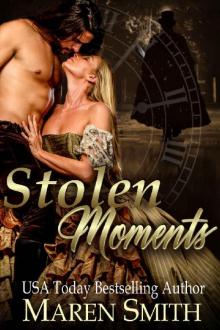 Stolen Moments: A Victorian Time Travel Romance
Stolen Moments: A Victorian Time Travel Romance Daddy Shark
Daddy Shark Seducing Sandy
Seducing Sandy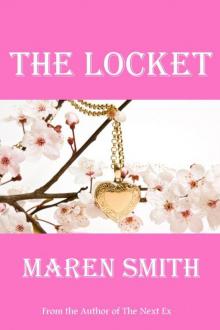 The Locket
The Locket Build-A-Daddy
Build-A-Daddy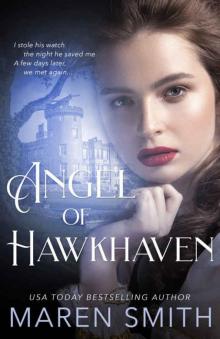 Angel of Hawkhaven
Angel of Hawkhaven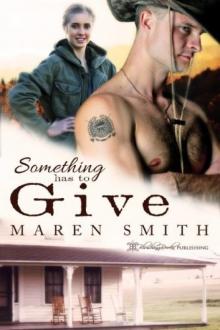 Something Has to Give
Something Has to Give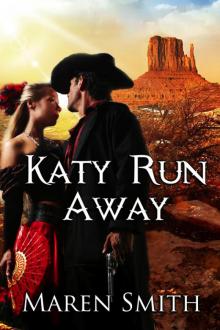 Katy Run Away
Katy Run Away Jinxie's Orchids
Jinxie's Orchids Fearless
Fearless Warming Emerald
Warming Emerald Jade's Dragon
Jade's Dragon Warming Emerald: The Red Petticoat Saloon
Warming Emerald: The Red Petticoat Saloon Binding Brinley (Captives of Pra'kir Book 1)
Binding Brinley (Captives of Pra'kir Book 1)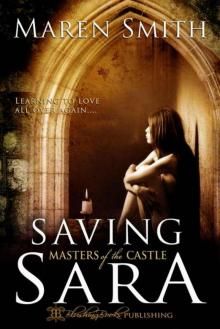 Saving Sara (Masters of the Castle)
Saving Sara (Masters of the Castle) Maddy Mine
Maddy Mine With Hearts Aflame: Valentine's Day Box Set
With Hearts Aflame: Valentine's Day Box Set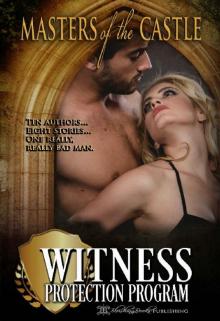 Masters of the Castle: Witness Protection Program
Masters of the Castle: Witness Protection Program Have Paddle, Will Travel (Corbin's Bend Season Two Book 7)
Have Paddle, Will Travel (Corbin's Bend Season Two Book 7) Chasing Chelsea (Masters of the Castle)
Chasing Chelsea (Masters of the Castle)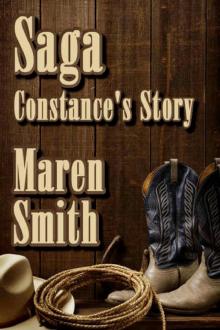 Saga: Contance's Story
Saga: Contance's Story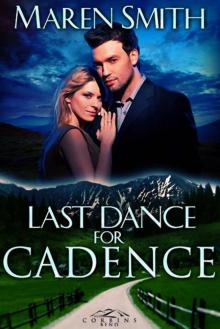 Last Dance for Cadence
Last Dance for Cadence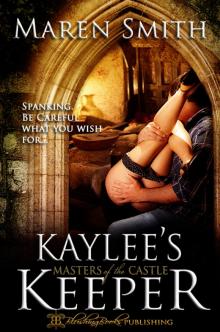 Kaylee's Keeper
Kaylee's Keeper Mischief Under The Mistletoe
Mischief Under The Mistletoe Sweet Sinclair (Masters of the Castle)
Sweet Sinclair (Masters of the Castle) Black Sheep
Black Sheep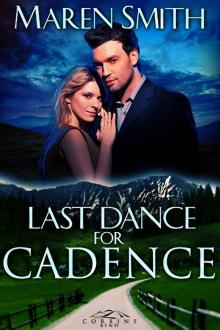 Last Dance for Cadence (Corbin's Bend)
Last Dance for Cadence (Corbin's Bend) Varden's Lady
Varden's Lady Holding Hannah (Masters of The Castle)
Holding Hannah (Masters of The Castle)